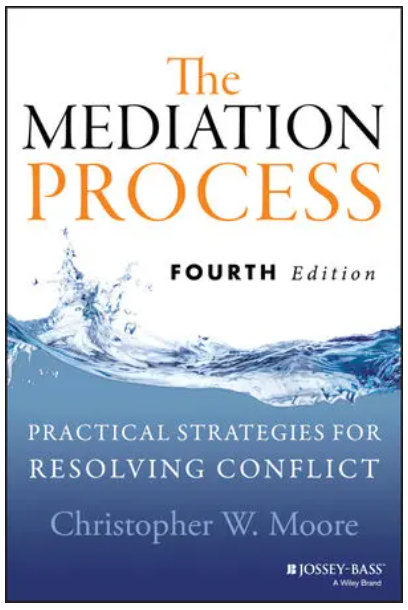The Mediation Process – Practical Strategies for Resolving Conflict
The Workplace Problem: How Can Organizations Effectively Resolve Conflicts?
Conflicts are an inevitable aspect of any workplace, arising from differences in perspectives, interests, and communication styles. Unresolved disputes can lead to decreased productivity, low morale, and a toxic work environment.
So, how can organizations implement effective strategies to manage and resolve conflicts constructively?
What This Book is About
The Mediation Process by Christopher W. Moore is a comprehensive guide that delves into the intricacies of mediation as a tool for conflict resolution. Now in its fourth edition, this seminal work offers a detailed, step-by-step account of how to utilize mediation to address and resolve disputes across various contexts. Moore combines theoretical insights with practical strategies, enriched by real-life examples, to illustrate the mediation process from initiation to resolution. The book emphasizes the importance of understanding the underlying causes of conflict and provides mediators with the tools to facilitate effective communication and negotiation between parties.
Key Takeaways for HR and Workplace Leaders
Comprehensive Mediation Framework: The book outlines a structured approach to mediation, guiding practitioners through each stage of the process, from initial contact with disputing parties to the implementation of agreements.
Understanding Conflict Dynamics: Moore emphasizes the necessity of analyzing the root causes of conflicts, enabling mediators to address underlying issues rather than just surface-level symptoms.
Cultural Sensitivity in Mediation: The text explores how mediation practices can be adapted to suit diverse cultural contexts, ensuring that conflict resolution approaches are respectful and effective across different backgrounds.
Practical Strategies and Techniques: Readers are equipped with actionable tools and methods to manage emotions, facilitate communication, and break deadlocks during mediation sessions.
Ethical Considerations: The book discusses the ethical responsibilities of mediators, including maintaining neutrality, confidentiality, and fostering voluntary participation.
Workplace Tools and Models from the Book
Conflict Analysis Framework: A tool designed to help mediators and HR professionals dissect the components of a conflict, identifying stakeholders, interests, and potential areas for agreement.
Mediation Planning Checklist: A step-by-step guide to prepare for mediation sessions, ensuring that all logistical and relational aspects are considered.
Communication Facilitation Techniques: Methods to promote open dialogue between disputing parties, including active listening, reframing statements, and managing nonverbal cues.
Agreement Drafting Templates: Sample formats and guidelines for documenting the outcomes of mediation, ensuring clarity and commitment from all parties involved.
Why This Matters for HR and Workplace Leaders
HR professionals and organizational leaders are often tasked with addressing conflicts that, if left unresolved, can escalate and disrupt workplace harmony. The Mediation Process offers strategies to:
✔ Enhance Conflict Resolution Skills: By adopting the structured approaches detailed in the book, leaders can effectively mediate disputes, fostering a collaborative work environment.
✔ Promote a Culture of Open Communication: Implementing the book's techniques encourages employees to voice concerns and resolve differences constructively.
✔ Reduce Turnover and Increase Job Satisfaction: Effective conflict management leads to improved employee relations, higher morale, and retention.
✔ Ensure Legal and Ethical Compliance: Understanding the ethical considerations in mediation helps organizations navigate disputes while upholding integrity and legal standards.
How This Connects to Workplace Assessments and Restorations
Workplace assessments often reveal underlying conflicts that hinder organizational performance. By applying the principles from The Mediation Process, HR leaders can:
Identify Root Causes of Disputes: Utilize the conflict analysis framework to uncover and address the fundamental issues leading to disagreements.
Develop Tailored Mediation Programs: Design mediation strategies that align with the organization's culture and the specific nature of conflicts identified.
Monitor and Evaluate Resolution Outcomes: Implement mechanisms to assess the effectiveness of mediation efforts and make necessary adjustments for continuous improvement.
How Can You Apply This?
➡️ Are unresolved conflicts affecting your team's productivity and morale?
➡️ Do you have a structured approach to manage and resolve disputes within your organization?
Applying the strategies from The Mediation Process can transform how your organization handles conflicts, leading to a more harmonious and efficient workplace.
Where to Buy
Interested in reading The Mediation Process: Practical Strategies for Resolving Conflict? You can purchase it here:
📚 Amazon
📚 Wiley

